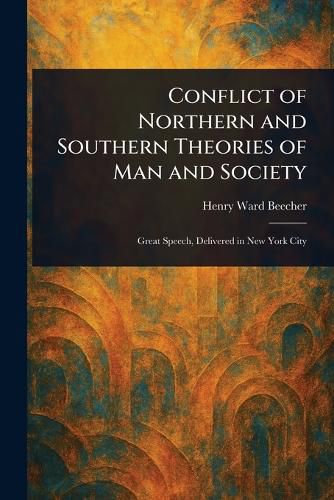Readings Newsletter
Become a Readings Member to make your shopping experience even easier.
Sign in or sign up for free!
You’re not far away from qualifying for FREE standard shipping within Australia
You’ve qualified for FREE standard shipping within Australia
The cart is loading…






This title is printed to order. This book may have been self-published. If so, we cannot guarantee the quality of the content. In the main most books will have gone through the editing process however some may not. We therefore suggest that you be aware of this before ordering this book. If in doubt check either the author or publisher’s details as we are unable to accept any returns unless they are faulty. Please contact us if you have any questions.
Explore the deeply rooted tensions that fueled the American Civil War with Henry Ward Beecher's powerful speech, "Conflict of Northern and Southern Theories of Man and Society." Delivered in New York City, this vital historical document dissects the clashing political ideologies and social theories surrounding slavery that sharply divided the nation. Beecher, a prominent voice of his time, fearlessly confronts the ethical and societal implications of sectionalism, providing invaluable insight into the era's complex debates. This meticulously prepared print edition offers a crucial perspective on the political and governmental landscape of the United States between 1853 and 1857, illuminating the critical period leading up to the Civil War. A significant contribution to understanding the historical context of one of America's most defining conflicts, this work remains essential for anyone seeking a deeper comprehension of the forces that shaped the nation.
This work has been selected by scholars as being culturally important, and is part of the knowledge base of civilization as we know it.
This work is in the public domain in the United States of America, and possibly other nations. Within the United States, you may freely copy and distribute this work, as no entity (individual or corporate) has a copyright on the body of the work.
Scholars believe, and we concur, that this work is important enough to be preserved, reproduced, and made generally available to the public. We appreciate your support of the preservation process, and thank you for being an important part of keeping this knowledge alive and relevant.
$9.00 standard shipping within Australia
FREE standard shipping within Australia for orders over $100.00
Express & International shipping calculated at checkout
This title is printed to order. This book may have been self-published. If so, we cannot guarantee the quality of the content. In the main most books will have gone through the editing process however some may not. We therefore suggest that you be aware of this before ordering this book. If in doubt check either the author or publisher’s details as we are unable to accept any returns unless they are faulty. Please contact us if you have any questions.
Explore the deeply rooted tensions that fueled the American Civil War with Henry Ward Beecher's powerful speech, "Conflict of Northern and Southern Theories of Man and Society." Delivered in New York City, this vital historical document dissects the clashing political ideologies and social theories surrounding slavery that sharply divided the nation. Beecher, a prominent voice of his time, fearlessly confronts the ethical and societal implications of sectionalism, providing invaluable insight into the era's complex debates. This meticulously prepared print edition offers a crucial perspective on the political and governmental landscape of the United States between 1853 and 1857, illuminating the critical period leading up to the Civil War. A significant contribution to understanding the historical context of one of America's most defining conflicts, this work remains essential for anyone seeking a deeper comprehension of the forces that shaped the nation.
This work has been selected by scholars as being culturally important, and is part of the knowledge base of civilization as we know it.
This work is in the public domain in the United States of America, and possibly other nations. Within the United States, you may freely copy and distribute this work, as no entity (individual or corporate) has a copyright on the body of the work.
Scholars believe, and we concur, that this work is important enough to be preserved, reproduced, and made generally available to the public. We appreciate your support of the preservation process, and thank you for being an important part of keeping this knowledge alive and relevant.